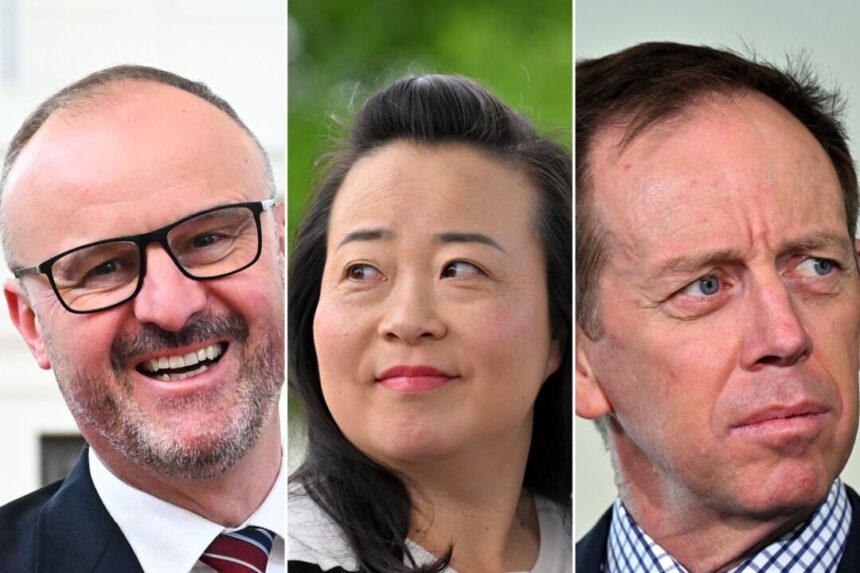The Independents for Canberra movement saw an 8.5 percent swing in their favor during the recent election. Despite a 3.3 percent swing against Labor, ACT Chief Minister Andrew Barr is set to form government for an unprecedented seventh consecutive term. His Labor Party is projected to win at least 10 seats in the 25-seat Legislative Assembly, with the Greens likely to secure three seats. The progressive jurisdiction of the Australian Capital Territory has ambitious climate change targets and has legalized possession of small amounts of heroin and cocaine. Additionally, the ACT was the only jurisdiction to vote in favor of the Voice referendum to enhance Indigenous recognition in the Constitution. Barr expressed gratitude and pride for his party’s achievements, acknowledging the hard work of every Labor candidate. Despite Labor’s success, he recognized the efforts of the opposition, particularly Liberal leader Elizabeth Lee. Lee conceded defeat, acknowledging Labor’s strong campaign and the inability of the Liberal Party to gain enough ground to unseat them after 23 years in power. She praised Labor’s seven consecutive election wins and thanked her Liberal candidates for their efforts. Despite her promises on addressing cost-of-living pressures and urban development, Lee could not overcome Labor’s dominance in the territory. She has vowed to continue holding the government accountable despite the setback.
While the Liberals managed to increase their seat count by one, it was still not enough to overthrow Barr’s government.
Greens Lose Grip, Independents Emerge
Although Labor is projected to retain 10 seats, their coalition partner, the ACT Greens, is facing a decrease in their representation.
The Greens are expected to lose half of their seats, dropping from six to three—a significant setback for the party that played a pivotal role in the previous government.
ACT Greens Leader Shane Rattenbury and MP Jo Clay are likely to hold onto their seats, but the party’s influence in the Legislative Assembly will be notably reduced.
On the other hand, independents are emerging as potential kingmakers, with the Independents for Canberra leader Thomas Emerson poised to win a seat with 10.2 percent of the vote.
Similarly, independent Fiona Carrick seems to be on track to secure a seat in Murrumbidgee with 11.7 percent of the vote.
Emerson has drawn comparisons to the federal “teal” independent movement, which impacted the Liberal Party in several affluent electorates in Sydney, Melbourne, and Perth.
He has refrained from committing to supporting any specific party in forming a government, stating, “I think it would be a disservice to the people we’ve spoken to throughout our campaign to declare any position without first having meaningful conversations with both prospective leaders,” Emerson told ABC.
Labor Secures Path to Government
Despite facing a 3.3 percent swing against them, Labor remains well-positioned to form a government with the support of the Greens.
Labor Ministers Yvette Berry and Tara Cheyne are likely to retain their seats in Ginninderra, and backbencher Michael Pettersson is expected to be re-elected.
Among the Liberals, Leader Elizabeth Lee, Deputy Leader Leanne Castley, and MP Jeremy Hanson have all secured re-election.
Liberal MPs Mark Parton and Peter Cain, along with candidate Deborah Morris, are also likely to join the Legislative Assembly.
Barr Pledges to Keep Canberra ‘Progressive’
Having served since 2014, Barr has consistently advocated for progressive reforms, ranging from marriage equality to climate action.
“We were the first city in Australia to be powered 100 percent by renewable electricity,” Barr highlighted in his address.
“We are now building the Big Canberra Battery to store that renewable energy.”
Emphasizing the importance of climate action, Barr added, “We will not take a backward step on climate action.”
Throughout his campaign, Barr emphasized his government’s experience and stability as key selling points, cautioning against the risks of political change.
His commitment to maintaining Canberra as a “progressive” city resonated with voters, particularly as he pledged to expand the light rail project, electrify the bus fleet, and construct new cultural facilities.




